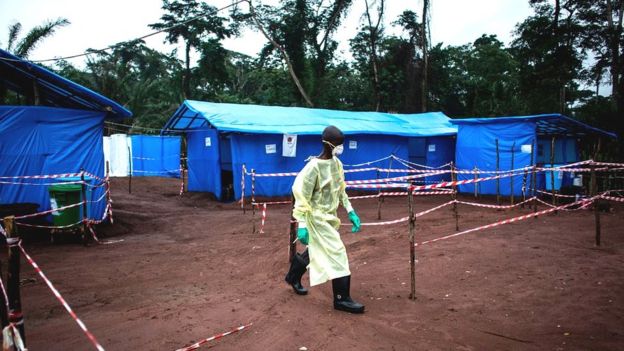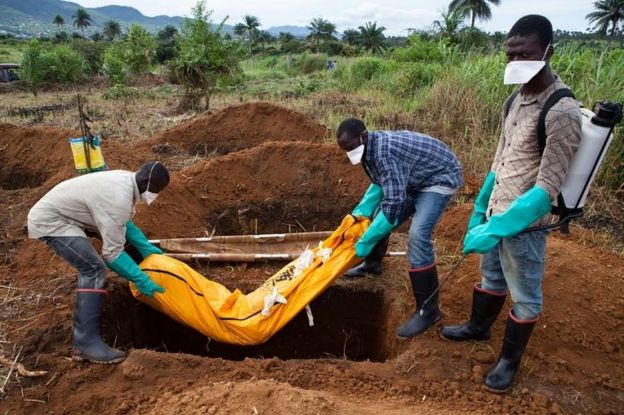The Ebola virus has reared its head again, this time in the Democratic Republic of Congo. While it is impossible to predict exactly where and when the next outbreak will occur, we now know much more about how to prevent a crisis.
The news of an Ebola outbreak in the town of Bikoro in north-west DRC instantly brings to mind the horror of the epidemic that took 11,000 lives and infected 28,000 people in West Africa between 2014 and 2016.
It is a nightmare no-one wants to relive - or should have to.
Since 4 April in the DRC, there have been more than 30 possible cases - involving 18 deaths - although only two incidents have so far been confirmed as Ebola.
So why does Ebola keep coming back and what work is being done to prevent a repeat of the tragedy in West Africa?
Out of control
Ebola can spread rapidly, through contact with even small amounts of bodily fluid of those infected. Its early flu-like symptoms are not always obvious.
Its appearance in Bikoro - a market town close to other local towns, well connected by major rivers and near the national border - is a cause for concern.
This is an area where people connect, trade and travel - an environment ripe for spreading disease.
The West African epidemic of 2014-16 began in a small border village in Guinea, its first victim thought to be a two-year-old boy who died in December 2013.
 Image copyrightGETTY IMAGES
Image copyrightGETTY IMAGES
Image captionThe last Ebola outbreak in the DR Congo was in 2017 and killed four people
The disease spread quickly across Guinea and neighbouring Sierra Leone and Liberia, spiralling out of control when it reached urban centres.
DRC is thousands of miles from the West African countries devastated by that epidemic.
That it should reappear so far away is not in itself a surprise.
The Ebola virus has been traced back to two simultaneous outbreaks in 1976 - 151 people died in the Nzara area, South Sudan, and 280 in the Yambuku area, near the Ebola river, from which the disease takes its name.
This latest outbreak is the ninth in DRC, which has seen all three Ebola outbreaks to have occurred since the 2014-16 epidemic.
In total, there have been 24 recorded outbreaks - in addition to the 2014-16 epidemic - in west and central Africa, including in DRC, Uganda, Sudan and Gabon. The number of deaths has ranged from one to 280.
While we can identify high-risk areas, it is unrealistic to expect that we could ever eradicate this disease and impossible to know when or where the next outbreak will occur.
Fruit bats are thought to be the main host of the disease, but it is also introduced into the human population through close contact with the blood, organs or other bodily fluids of other infected animals. These can include chimpanzees, gorillas, monkeys, antelope and porcupines.
Looking for 'patient zero'
We can, however, stop outbreaks becoming epidemics and we can better protect people.
A swift and well-co-ordinated response can ensure disease is contained early on, so as few people as possible become ill and die.
For example, an outbreak in DRC almost a year ago was quickly contained.
 Image copyrightAFP
Image copyrightAFP
Image captionThousands died as Ebola hit West Africa in 2014-16
It was in a very remote area in the country's northern region, further from borders and so perhaps less of a risk than the current outbreak.
But an immediate response was still critical and meant the impact was limited to four deaths and four survivors.
Latest Stories
-
Biden takes aim at ‘tech industrial complex’ in farewell speech
21 minutes -
Biden says Gaza deal based on his framework while Trump claims credit
34 minutes -
Ex-convict, 22, jailed in Tarkwa for threatening to stab student
3 hours -
JoyNews poll: Akufo-Addo, his government’s ‘killer’ taxes and nepotism blamed for NPP’s 2024 defeat
3 hours -
Malian PM arrives in Accra with special message for Mahama
3 hours -
Barca scores 5 again in Copa del Rey win over Betis
4 hours -
Harry Kane scores again as Bayern thrash Hoffenheim
5 hours -
Arsenal win North-London derby to close gap at the top
5 hours -
Djokovic breaks Federer record in Melbourne win
5 hours -
Foreign Affairs Ministry lists categories of recalled diplomatic and service passports
5 hours -
NAELP refutes defamatory claims, highlights achievements
6 hours -
2024 Election: Voter apathy caused NPP’s defeat – Justin Kodua
6 hours -
Ghanaian teacher shortlisted for GEM’s $1m global prize
6 hours -
Young entrepreneurs encouraged to capitalise on 5-year tax exemption Incentives
7 hours -
Lord Morrgan fulfils promise; gifts fan Wale new motorbike
7 hours

